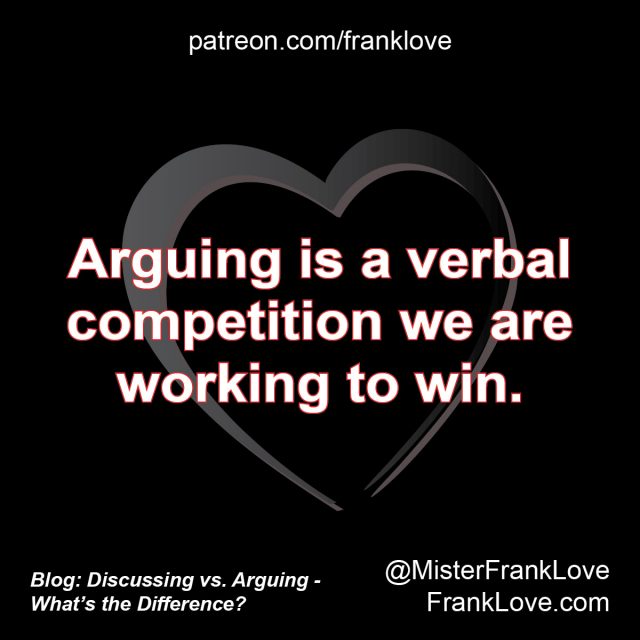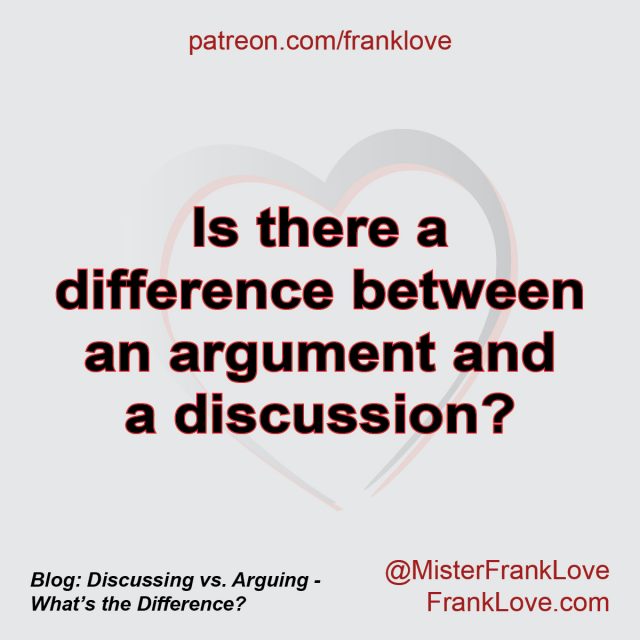
In my previous blog, “Gratitude Is…” I talked about the importance of gratitude within a loving relationship and identified some non-verbal ways to express gratitude. This week’s blog focuses on another valuable relationship interaction — discussion, and how it is different from arguing.
I love to talk to people and share ideas. It’s fun. It’s enlightening. It’s comforting.
Most Tuesday nights, when I am in town, a small group of friends and I get together for “Wing Night.” The name is an homage to the cheap wings (25¢ each) that used to be offered at a local watering hole where we would meet. “Wing Night” now is a basic menu with no cheap specials. Go figure.
If I had to pick between going with friends to a nightclub or a lounge (or even a backyard), the lounge (or backyard) would win every time. There, my friends and I can philosophize or share thoughts over whatever any of us brings to the table. It’s great.
How to Tell The Difference Between Arguing and Discussing
To our credit, we discuss many issues and arguments rarely occur among us. They happen, but rarely.
One of the elements that keeps the tone of our conversation relatively moderate is our understanding of one another. We are all characters, and we typically know each other’s spin or slant on a given issue.
After reflecting on our dynamic and witnessing the chemistry between some couples where there is constant arguing and bickering, I felt it was time to give some frank love on the differences between arguing and discussing.
How to Recognize Argument
Arguing is a verbal competition, where one or more parties are working to win. In fact, one of the definitions of argue on merriam-webster.com is “dispute.” A “win” in an argument may be a third party saying, “I think this person is right,” or by one party shutting down the other.
A few hallmarks of arguing are:
- Name calling (You’re an idiot!)
- Verbal condescension (What a stupid idea!)
- Raised voices or yelling
- Accusations (You’re a liar!)
- Being physically dismissive (eyerolling or multitasking while the other party is talking)
- Ignoring the other party’s presentation (not being able to recap what the other party said)
- Talking over the other party (interrupting when the other party is talking)
- Pointless back and forth (participants can’t recall the details the next day)
How To Recognize Discussion
Discussion is something altogether different. It is an exchange of ideas. This exchange can be for the sake of it, to learn something new, or to persuade a person to change their way of thinking. A win in a discussion is always win-win. There is no loser. Maybe one or both parties say something similar to “I respect that,” “Please explain further,” “I see what you’re saying,” or even “I disagree.”
A few hallmarks of discussion are:
- Affirming your partner’s presentation (being able to recap the other person’s point of view)
- Listening intently
- Acknowledging a partner’s good/strong points
- Investigative questions (How do you think that I could have handled that differently? or Do you think I handled that well?)
Arguing Is Destructive; Discussing Is Productive
Understanding the distinctions between arguing and discussing empowers each of us to make the best use of our conversations with our partners. When we find ourselves embodying any, some, or all of the arguing characteristics, let’s stop and take note of our disposition.
Our primary purpose of being in a relationship is to take care of one another. Arguing is not a way to effectively do so. Arguing is self-destructive, to ourselves, our partner and our partnership.

Discussing issues is a way of affirming yourself. It is productive. We are affirming that we picked a good partner. We are also affirming our partner’s opinions and the beauty of our relationship and our ability to “partner.”
Moving forward, let’s pay special attention to whether we are arguing. If we are, let’s check ourselves and make a concerted switch to discussing. Ironically, our most useful tool as we work to make the switch may be humor. We get to develop our ability to laugh at ourselves and our argumentative patterns. We need to start noticing them, or, if we are comfortable enough, have our partner call out these argumentative patterns. “Hahaha … I’m doing it again.” Then take a deep breath and practice discussing the issue.
Discussing issues instead of arguing can make a tremendous difference in the quality of our relationships. It can make a difference in the decisions that we make together. And it may even make a difference in our blood pressure. And that’s loving.
Keep Rising,
Frank Love
In my next blog post, “How We Listen Is Communication Too,” I take a look at the skill of listening and discuss how it is just as important (maybe more so) as speaking when it comes to relationship communication.
Watch Frank Love’s presentation “The Act of Caring.”
Subscribe to receive Frank’s weekly blog.
Become a sponsor of Frank Love and his work creating loving cultures in our relationships with a monthly contribution of as little as $2. Sign up today at Patreon.com/FrankLove.
–—–—–—–—–—–—–—–—–—–—–—–—–—–—–—–—––
Each week, Frank Love hosts Zoom support group meetings that assist women and men as we work to create a loving culture in
our relationships. Calls occur from 7 p.m. to 8:30 p.m. EST and can be accessed by visiting FrankWeeklyCall.com.
- Tuesdays—Black Women: Creating a Loving Culture in Our Relationships
- Thursdays—Black Men: Creating a Loving Culture in Our Relationships
–—–—–—–—–—–—–—–—–—–—–—–—–—–—–—–—– –
Frank Love coaches individuals toward creating a loving culture in their family. He is also the author of Relationship Conversations You Don’t Want to Have (But Should Anyway) and 25 Ways to Be Loving. To schedule a free consultation, contact Frank at Frank@FrankLove.com.


One comment
Ericka
December 21, 2023 at 3:50 PM
Great points made about the differences in arguments and discussions. I have often tried to figure out the difference. I would love for you to explore why some couples go from discussion to argument.